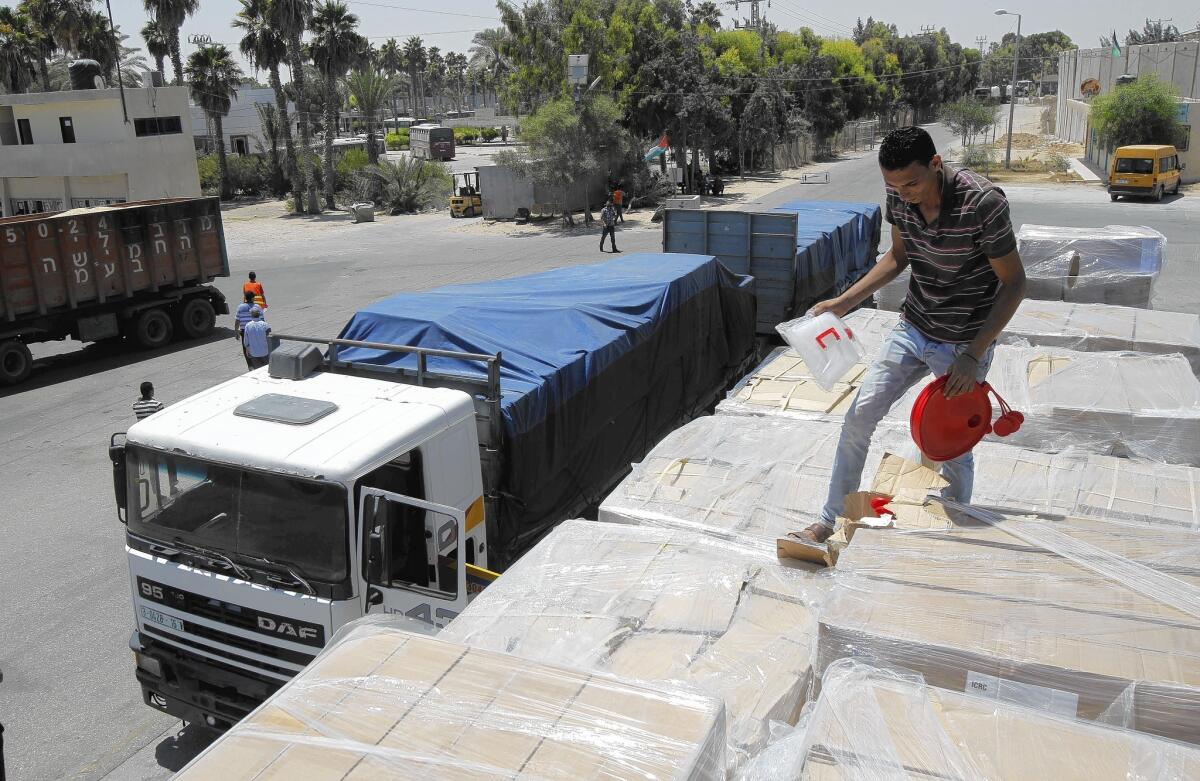Talks on extending Gaza cease-fire begin in Egypt

- Share via
Reporting from Cairo — Indirect Israeli-Palestinian talks aimed at extending a cease-fire in the Gaza Strip began in the Egyptian capital Wednesday, as guns remained silent for a second full day in the war-racked coastal enclave.
Before the three-day truce took effect Tuesday morning, Israel withdrew its ground forces from Gaza and halted aerial and naval bombardment, but warned it would respond to Palestinian attacks.
Rocket fire into Israel from Gaza, a daily occurrence for more than a month, has also fallen silent since the start of the cease-fire, though a series of false alarms rattled nerves in Israel on Wednesday. In Gaza, many Palestinians remained mistrustful of the truce, saying they were afraid to venture out too far. Several previous cease-fires broke down, with fresh fighting trapping Gazans as they left shelters to check on their damaged homes.
Israeli officials refused to confirm reports of a cease-fire extension until Monday, but a senior official, speaking on condition of anonymity because of the sensitivity of the situation, said Israel would have “no problem” with the truce being unconditionally augmented.
Israeli Prime Minister Benjamin Netanyahu sought anew to deflect international criticism over heavy Palestinian casualties during the four weeks of fighting.
Speaking to journalists for the first time since the start of the truce, Netanyahu said Israel had been forced to use harsh measures, including heavy bombardment of civilian areas, to defend itself against Hamas rockets and cross-border infiltration tunnels.
“It was justified. It was proportionate,” he said of the Israeli military campaign, echoing language he and aides have used through much of the conflict.
Nearly 1,900 Palestinians have died in the Gaza fighting, which broke out July 8 after weeks of rocket fire aimed at Israel by Hamas and other militant groups. Israel’s military has said that up to 900 of those killed were militants; human rights groups estimate that about two-thirds of the Palestinian fatalities were civilians.
In the course of its ground offensive, Israeli forces have been criticized for using battlefield weapons that are difficult to aim with pinpoint accuracy, and they have been accused even by allies such as the United States of not exercising sufficient caution when targeting militants operating close to civilian areas. Over the last three weeks, deadly strikes hit in or near at least half a dozen United Nations-designated shelters in Gaza.
Israel has blamed Hamas for the high casualty rate, saying the militant group deliberately places noncombatants in harm’s way by using densely populated neighborhoods as a staging area for attacks and tunnels.
Israel acted unilaterally in withdrawing its ground forces, but it nonetheless agreed to hold indirect talks in hopes of staving off renewed fighting. In Cairo, Hamas has rejected Israeli demands that it disarm as part of a longer-term accord.
Special correspondent Hassan reported from Cairo and special correspondent Sobelman from Jerusalem. Times staff writer Laura King in Gaza City contributed to this report.
More to Read
Sign up for Essential California
The most important California stories and recommendations in your inbox every morning.
You may occasionally receive promotional content from the Los Angeles Times.










